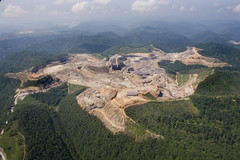News
New Alliance for Appalachia Receives $225,000 Grant
Tuesday, August 5th, 2008

The Public Welfare Foundation’s Newsroom posted this article about the Alliance for Appalachia and its two-year $225,000 grant:
New Appalachian Alliance receives $225,000 grant
Washington, D.C.–The Public Welfare Foundation has awarded a two-year, $225,000 grant to the [Alliance for Appalachia], a cooperative effort launched by 13 advocacy groups in Kentucky, North Carolina, Tennessee, Virginia and West Virginia. The Alliance aims to stop mining companies from shearing off mountaintops to get at coal deposits, a practice which the US Environmental Protection Agency estimates has damaged or destroyed at least 400,000 acres of southern Appalachian forests and 1,200 miles of mountain streams since the 1980’s.
“By combining forces, we feel very strongly we have a better chance of protecting these communities and stopping mountaintop removals,” says Mary Anne Hitt of Appalachian Voices, an advocacy group based in Boone, NC. “We’re trying to build a national network of people who will help change federal policies and educate decision-makers on mountaintop removal.”
Opponents of mountaintop mining argue that it not only wreaks havoc with the environment but that it also sinks Appalachian communities deeper into poverty. “One of the biggest tragedies of mountaintop removal is that it has left in its wake some of the worst poverty in the nation,” says Hitt. “You’d think that with all the billions of dollars being extracted out of these areas, the streets should be paved with gold. But it’s the exact opposite.”
Much of the profit flows out of state in the form of royalties to out-of-state owners or proceeds from coal sales. Automation has reduced the number of jobs in mining. “The vast majority of the profits are going out of those communities,” says Hitt, “and what’s left behind is a toxic, denuded landscape that’s not very attractive for future economic development.”
“I grew up in the mountains, and there were trees and plants and lots of wildlife,” says Terri Blanton of Berea, Ky. “People supplemented their income by collecting different herbs, ginseng being the most important of them.” Such woodland plants don’t grow back, she says, after nearby mountaintops have been leveled and the topsoil stripped away, and tougher non-indigenous grasses introduced to mined areas can’t sustain wildlife such as deer.
“It’s almost like you’ve been transplanted into the desert someplace,” says Blanton. “And mountaintop mining also destroys the water tables and the aquifers underneath. We’re having a lot of heavy metal runoff. It’s killing the streams – they’re just gravel pits, like drainage ditches. People live in the valleys, so when it rains, we’re having great floods, and all our streams are running with dirt. People down here say the Kentucky River is too thick to swim and too thin to plow.” Silt fouls drinking water, kills fish and, without mountain vegetation to hold water, the valleys become caught up in cycles of drought alternating with flash floods.
The situation could worsen by 2012, when the US Environmental Protection Agency projects that mountaintop removal mining could encompass some 1.4 million acres of Appalachian wilderness and 2,400 miles of streams, obliterating the habitat of countless birds, fish, wildlife and plants and scarring a vast landscape rich in natural and human history.
Over the summer, after years of waging often futile local campaigns to block nearby mountaintop mining operations, citizens’ advocacy groups across the southern Appalachian region decided to band together to form the multi-state Alliance. The Public Welfare Foundation, which had previously awarded grants to five Alliance member organizations over the past four years, strongly encouraged those groups to coordinate efforts and take advantage of force-multipliers such as shared research, litigation, leadership development and training and public and media strategies. In addition to the $225,000 committed by the Foundation, alliance members are seeking $200,000 from several other foundations and funding sources.
Alliance leaders say their first priority is convincing federal policymakers to retain a regulation barring surface and mountaintop mining from disturbing land within 100 feet of a stream. The US Interior Department’s Office of Surface Mining is proposing to do away with the so-called “stream buffer zone” rule. Over the longer term, Alliance members plan to intensify their efforts to raise public awareness about the damages inflicted on highlands and the communities below when stream beds are buried under tons of mining rubble. In 2002, federal officials loosened anti-dumping regulations issued under the US Clean Water Act. That’s a stance the citizens’ groups hope to reverse.
“Dumping mountaintop waste into streams makes it economical for them to do mountaintop removal,” says Hitt. If filling streams with rubble is banned, she argues, it stands to reason that many mining companies will shift to more surgical coal extraction methods, creating a more conducive climate for farming, tourism and other industries.
To check out the article in its original form, visit The Public Welfare Foundation’s website.









